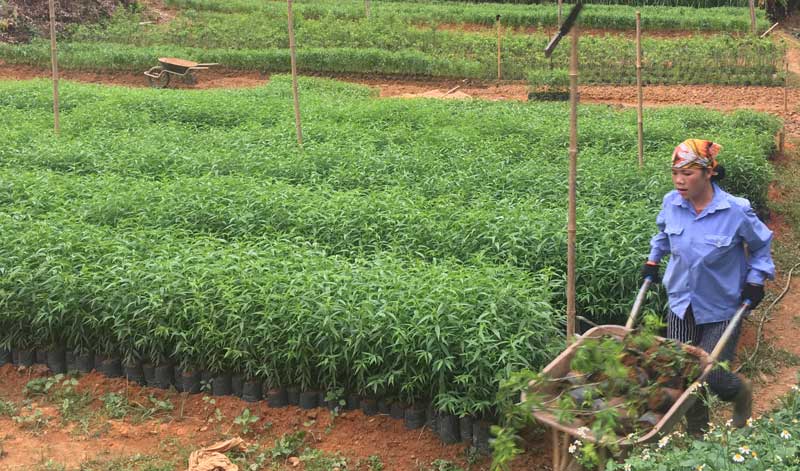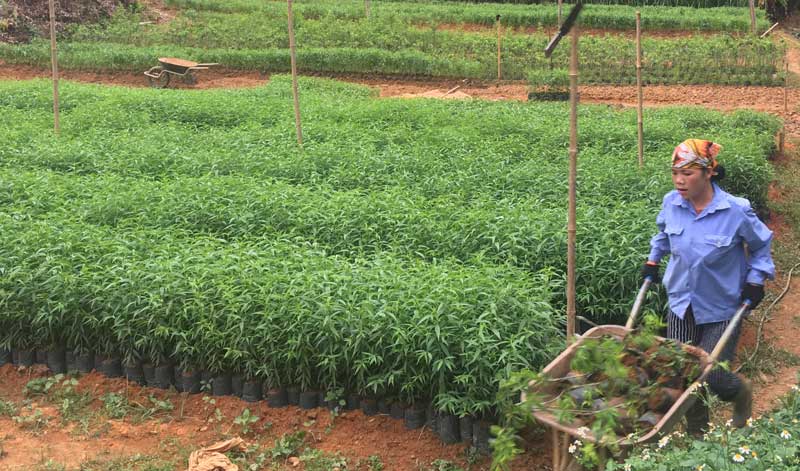
(HBO) – The northern province of Hoa Binh is now home to six agricultural seed production and trade centres, including Cao Phong MTV Ltd. Co., Song Boi MTV Ltd. Co., Hoa Binh agricultural services joint Stock Company, Phuong Huyen seed production and trade Ltd. Co., and Boi river maize production and research centre.
Some companies such as the Hoa Binh agricultural services JSC yield an
annual average output of 400-500 tonnes of rice, 80-100 tonnes of maize, and
5-10 tonnes of vegetable seeds of all kinds. Meanwhile, the Phuong Huyen seed
production and trade Ltd. Co. creates about 150,000 orange and grapefruit seedlings.
The Boi river maize production and research centre supplies 270 tonnes of maize.
The centre for seedling, breeding animals and fisheries produces and sells
about 30,000 grapefruit seedlings and 75 tonnes of rice.
Deputy Director of the provincial Department of
Agriculture and Rural Development Vuong Dac Hung said the seed production and
trade companies have contributed to the provision of various seeds and
seedlings that ensure quality standards and meet seasonal crops and
agricultural production.
However, such facilities operate at a small
scale while the demand for seed varieties varies. Low-quality products without
origins are still sold in the market, causing heavy damage for farmers.
Particularly, some households without business licenses are selling products at
residential areas or markets, so it is difficult to control. The high cost of
local seedlings makes it difficult to compete with external products and those
with unclear origins. The province also lacks of management forces and
investment in the field.
Each year, the Phuong Huyen seed production company
supplies over 1,500,000 seedlings of various kinds, partially meeting the local
demand.
According to a survey, the local seed production meets about 20 percent of
vegetable seeds of all kinds, 15 percent of rice, and 20 percent of maize. The
provincial Department of Agriculture and Rural Development is focusing on
implementing measures from now to 2020 to develop a seed production system to
serve cultivation restructuring. Science-technology measures play a key role in
the field while increasing selection of parental line seeds is important alike./.
According to data from the Hoa Binh Provincial Party Committee, the industrial production index for the first six months of 2025 is estimated to have increased by 20% compared to the same period last year. This marks the highest year-on-year growth rate for this period since 2020.
In the first six months of 2025, Hoa Binh province’s export turnover was estimated at 1.145 billion USD, marking an 18.11% increase compared to the same period in 2024. Import turnover was estimated at $ 804 million, a 17.15% increase, which helped the province maintain a positive trade balance.
The lives of the ethnic minority farmers in Tan Lac district have gradually improved thanks to the new directions in agricultural production. This is a testament to the collective strength fostered through the professional associations and groups implemented by various levels of the district’s Farmers’ Union.
With the motto the "product quality comes first,” after nearly one year of establishment and operation, Muong village’s Clean Food Agricultural and Commercial Cooperative, located in Cau Hamlet, Hung Son Commune (Kim Boi district), has launched reputable, high-quality agricultural products to the market that are well-received by consumers. The products such as Muong village’s pork sausage, salt-cured chicken, and salt-cured pork hocks have gradually carved out a place in the market and they are on the path to obtaining the OCOP certification.
In the past, the phrase "bumper harvest, rock-bottom prices" was a familiar refrain for Vietnamese farmers engaged in fragmented, small-scale agriculture. But today, a new spirit is emerging across rural areas of Hoa Binh province - one of collaboration, organisation, and collective economic models that provide a stable foundation for production.
Maintaining growing area codes and packing facility codes in accordance with regulations is a mandatory requirement for agricultural products to be eligible for export. Recently, the Department of Agriculture and Environment of Hoa Binh province has intensified technical supervision of designated farming areas and packing facilities to safeguard the "green passport" that enables its products to access international markets.



